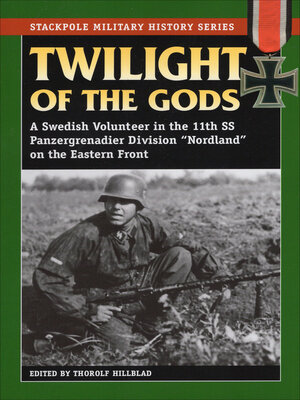Twilight of the Gods
ebook ∣ A Swedish Volunteer in the 11th SS Panzergrenadier Division "Nordland" on the Eastern Front · Stackpole Military History
By Thorolf Hillblad

Sign up to save your library
With an OverDrive account, you can save your favorite libraries for at-a-glance information about availability. Find out more about OverDrive accounts.
Find this title in Libby, the library reading app by OverDrive.



Search for a digital library with this title
Title found at these libraries:
| Library Name | Distance |
|---|---|
| Loading... |
A rare account of a non-German, Erik Wallin, who fought in the Nazi Party’s Waffen-SS during World War II—a no-holds-barred narrative of the Eastern Front.
This is the exciting true story of Erik Wallin, a Swedish soldier who volunteered for the Waffen-SS during World War II. Wallin served in the Panzer Reconnaissance Battalion of the 11th SS Panzergrenadier Division “Nordland,” a unit composed largely of men from Denmark, Norway, and Sweden. Sent to the Eastern Front, the 11th SS fought in the Courland Pocket in late 1944 and then battled the Red Army along the Oder River and in Berlin, where the Soviets destroyed the division.
Few memoirs of non-Germans in the Waffen-SS exist, and Twilight of the Gods ranks among the very best.
“Provides an insight into how a Waffen-SS soldier reflects on the recent past . . . [and] how the SS myth was created . . . direct and raw.” —Samuel de Korte, Traces of War
This is the exciting true story of Erik Wallin, a Swedish soldier who volunteered for the Waffen-SS during World War II. Wallin served in the Panzer Reconnaissance Battalion of the 11th SS Panzergrenadier Division “Nordland,” a unit composed largely of men from Denmark, Norway, and Sweden. Sent to the Eastern Front, the 11th SS fought in the Courland Pocket in late 1944 and then battled the Red Army along the Oder River and in Berlin, where the Soviets destroyed the division.
Few memoirs of non-Germans in the Waffen-SS exist, and Twilight of the Gods ranks among the very best.
“Provides an insight into how a Waffen-SS soldier reflects on the recent past . . . [and] how the SS myth was created . . . direct and raw.” —Samuel de Korte, Traces of War







